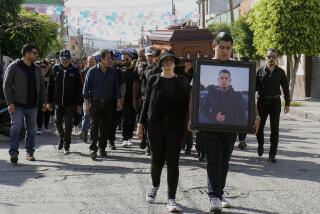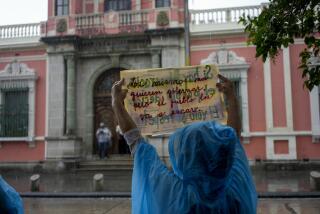Arms, Arson Are Campaign Fodder in Antigua Election
- Share via
ST. JOHN'S, Antigua — First came reports about arms and ammunition: shipping containers packed with rifles, grenades, launchers, pistols, bullets and tear gas, all consigned to the government of Antigua and Barbuda.
Then an unknown arsonist torched the headquarters of the twin-island nation’s opposition newspaper.
And then Antigua’s only prison burned to the ground.
Even by Antiguan standards, it has been an ominous few months leading up to parliamentary elections here March 9 that will determine the fate of one of the Caribbean’s longest-serving family dynasties.
In this tiny nation where conspiracy theories, charges unproved and mysteries unsolved have been as inseparable from politics as the pristine beaches are from the tourist trade, the arms shipments and fires have become campaign fodder in the hands of an opposition party long estranged from power.
Predictably, the opposition blames it all on Prime Minister Lester Bird and asserts that he and the incumbent Antigua Labor Party are desperate--fearful that, for what would be only the second time in more than a quarter of a century, a Bird would not be in power.
“This is the first one the Birds could actually lose since our independence” in 1981, asserts Leonard “Tim” Hector, the opposition newspaper publisher whose building was burned in November and who is contesting the parliamentary seat held by the prime minister’s brother, Vere Bird Jr.
The prime minister, who is the charismatic son of Vere Bird Sr. and thus the scion of the father of the Antiguan nation, has a predictably different spin on the race to fill 17 parliamentary seats.
Dismissing links between the recent events and the vote, Bird has ordered investigations into the two fires and told parliament that the arms were needed not to cow the population--as charged by the opposition--but to protect it by upgrading the police force.
“When it is not necessary to change, it is necessary not to change,” Lester Bird said, quoting a 17th century British nobleman, in opening his party’s convention last month. “And it’s necessary not to change, for a prudent man does not make a goat his gardener.”
Bird has backed that slogan with official statistics: 5% economic growth in 1998, unemployment below 5% and the second-highest wages in the Caribbean.
Yet Hector’s opposition United Progressive Party and other government critics say the ruling-party campaign has also been negative. The prime minister has asserted that an opposition victory will bring economic collapse by scaring off the foreign investors and tourists who have built Antigua’s financial base.
And behind the scenes, critics say, ruling-party workers have been playing Antiguans against each other. Under an amnesty announced last year, Bird’s government granted citizenship to all foreigners living on the island at the time. That added several thousand Dominicans, Jamaicans, Asians and others to a voter registration list that now shows about 56,000 voters in a nation of 65,000 residents. The opposition claims that some on the list are either living abroad or dead.
The voter list itself is a key issue in a nation where the last elections, in 1994, “were unfair and deficient in virtually every respect,” according to a report last year on the state of democracy in the Caribbean published by the Washington-based Center for Strategic and International Studies.
“The quality of these elections are going to depend in significant part on the quality of that registration list,” the study’s author, Douglas W. Payne, said in an interview this week.
What is more, added Clarvis Joseph, head of Antigua’s Chamber of Commerce and an opposition supporter, “elements of the ruling party have been seeking to activate the new immigrant vote, using threats like, ‘If you don’t vote for us, we’ll kick you out’ or ‘If the opposition wins, they’ll kick you out.’ It could turn the native Antiguan population against the immigrants.”
Joseph also cited the island’s tradition of revenge politics. When the opposition left office in 1976, Bird’s party jailed its former prime minister on corruption charges. Now the ruling party may fear that the opposition, which in turn often accuses the Bird administration of corruption, will pursue those charges if it gets into office.
“So you have a set of desperate people who feel they must retain power,” he said.
More to Read
Sign up for Essential California
The most important California stories and recommendations in your inbox every morning.
You may occasionally receive promotional content from the Los Angeles Times.













